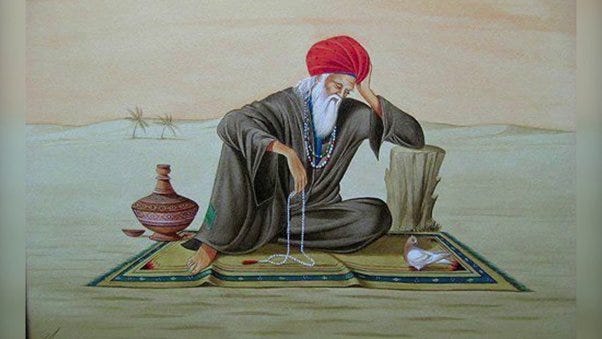
Article by
Who is not familiar with Bulleh Shah? The main motive behind my acquaintance with Bulleh Shah is Ustad Nusrat Fateh Ali Khan, who immortalized him forever by singing dozens of his poems. Bulleh Shah (1680-1757) was a famous Sufi poet and musician. He pledged allegiance to Shah Inayat Qadri and learned the mysteries of Sufism from his mentor. Shah Inayat Qadri played an important role in the spiritual training of Bulleh Shah. Shah Inayatullah Qadri Shatari Kasuri Lahori was one of the great Sufis and Saints of Punjab. He was born in Kasur in 1643. His ancestors belong to Lahore who settled here back to back. This family, involved in farming and horticulture, consists of noble elders.
According to Mufti Ghulam Sarwar Qadri, "Shah Inayat was born as a farmer, that is, a zamindar". Farming was his source of livelihood. He received his initial education in Kasur, after reaching Lahore, he joined the teaching circle of Shah Muhammad Raza Qadri Al-Shatari Lahori. He came to Kasur, where the circle of education became very wide, and people began to quench their thirst for knowledge and spirituality. The ruler of Kasur, Hussain Khan Khizgi (Afghan), ordered him to leave Kasur after this, he came to Lahore and settled permanently. Shah Inayat Qadri is considered to be a high-level commentator, jurist and one of the great scholars of Punjab. Here are some of his works. Ghayat Al Hawashi, Al-Muktaqit al-Haqiq Sharh Kunz al-Daqeeq, Tanqeeh al-Maram per Mubhas al-Wujud, Lataif Ghabiyyah, Azkar e Qadria, Majmooa e Irfani Shara Majmooa e Sultani, Dastoor Ul Amal, Azkar e Ghabiyyah, Kalmaat al-Tamaa Fi Romat'an al-Shafaat,, Bahz al-Ta'at, Hawashi Jawahar Khamsa, Risalah Min Qal in Dua Fi al Rizq Kufr, Risala Fi Hal Sharb-ud-Dukhan. Seeing Shah Inayat Shah Qadri's fame and circle of interest growing, a group of his opponents and haters was born, and especially when Baba Bulleh Shah pledged allegiance to him, a storm arose that a Syed Zada has become a disciple of an Arain. But Bulleh Shah strongly defended his mentor and condemned his own Sayyadat.
Bully nu samjhavan ayan behnaa ty bharjaaiyan
Mun ley bullya sada kehna chad de plah araiyan
Al e Nabi Aulad e Ali ty tu kiuin leekan laaiyan
Jehada Sano Sayyed Akhe dizakh milan sazzaiyan
Jehra Sahanon Arain Akhe Beheshti Peengan Paiyan
In order to keep his mentor's head high, Baba Bulleh Shah prefers to be an Arain instead of being a Syed, this is unusual for a mentor and has very few precedents in history. Shah Inayat Qadri was a follower of the Qadri school of thought as per Sufi tradition.. He is related to Shah Abdul Qadir Jilani, the spiritual leader of Baghdad. This is confirmed by Bulleh Shah as follows.
Piran Pir Baghdad Asada, Murshid Takht Lahore
O asin sabh ikko koi aap gaddi aap dor
Hazrat Shah Inayat Qadri is the text of Baba Bulleh Shah's poetry and the love and devotion to Murshid shines through Bulleh Shah's poetry. Those who say that Bulleh Shah and Shah Inayat Qadri are two sides of the same rope who pull each other towards them. Watch the last lines of a Kaafi (Punjabi poem) by Bulleh Shah
Arsh Manwar Millian Bangan Sundian Takht Lahore
Shah Inayat Kandian Payan Luk Chhup Khichda Dor
It was a sign of devotion and dedication to Murshid that he showed every time in his poetry.
Bulleh Shah nu saddo Shah Inayat de boohy
Jis ny saanu pvaey choly saavy ty soohy
Saanu ghayal kar k murr khabar a lai aa
Tere Ishq nachaya karke thayya thayya
Bulleh Shah has used a unique and strange word "thug" for Shah Inayat Qadri in his poetry. See one of his Kaafi poems.
De Didar Hoya Jad Rahi, Anchchit Pai Gul Phaahi
Dadhi Keeti Laa Parvaahi, Menu Mil Gya Thug Lahore
He maintained his unique and matchless style by referring to Shah Inayat as the "Thug of Lahore''. The words of Sufi sages often contain symbolism. The word "thug" is used here as a Sufi symbol. Thugs were people who cheated people and stole their property. From the Sufi point of view, "thug" is a symbol of worldly relations and desires. By calling Shah Inayat the "thug of Lahore '', Bulleh Shah wanted to convey that his mentor had advised him to stay away from worldly relations and desires. Little information is available about the relationship between Bulleh Shah and Shah Inayat. Some people believe that they had a great relationship, while others believe that they had some differences. According to the historical references, there was a distance between them for some time due to some reasons, but later he tried hard to convince the Murshid and succeeded in convincing him. Whatever the reason for Bulleh Shah's calling Shah Inayat "the Thug of Lahore'', it is clear that his statement is a mythical allusion, criticism, realism, or expression of personal experience that is so beautiful and unique that he distinguishes him from other classical Punjabi poets, especially Sufi poets.
 Monthly "Azeem English Magazine", launched in 2000, records the information about diverse fields like mental health, literature, research, science, and art. The magazine's objective is to impart social, cultural, and literary values to society.
Monthly "Azeem English Magazine", launched in 2000, records the information about diverse fields like mental health, literature, research, science, and art. The magazine's objective is to impart social, cultural, and literary values to society.
+92 51 88 93 092
First Floor, RAS Arcade, Eidhi Market, Street#124, G-13/4, Islamabad, Pakistan, 44000.